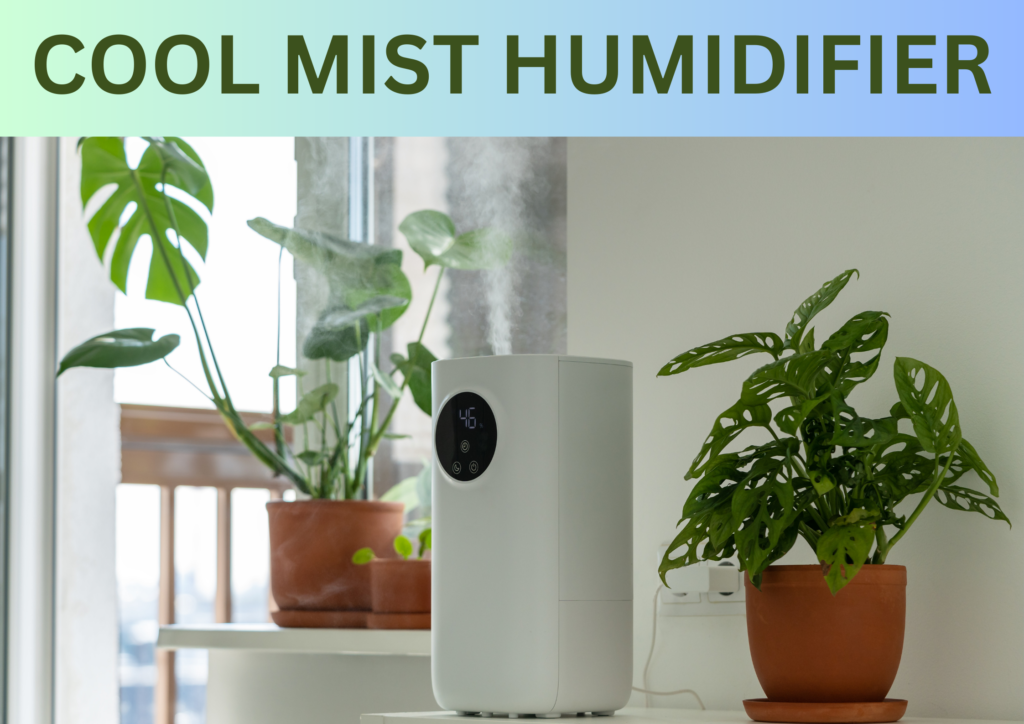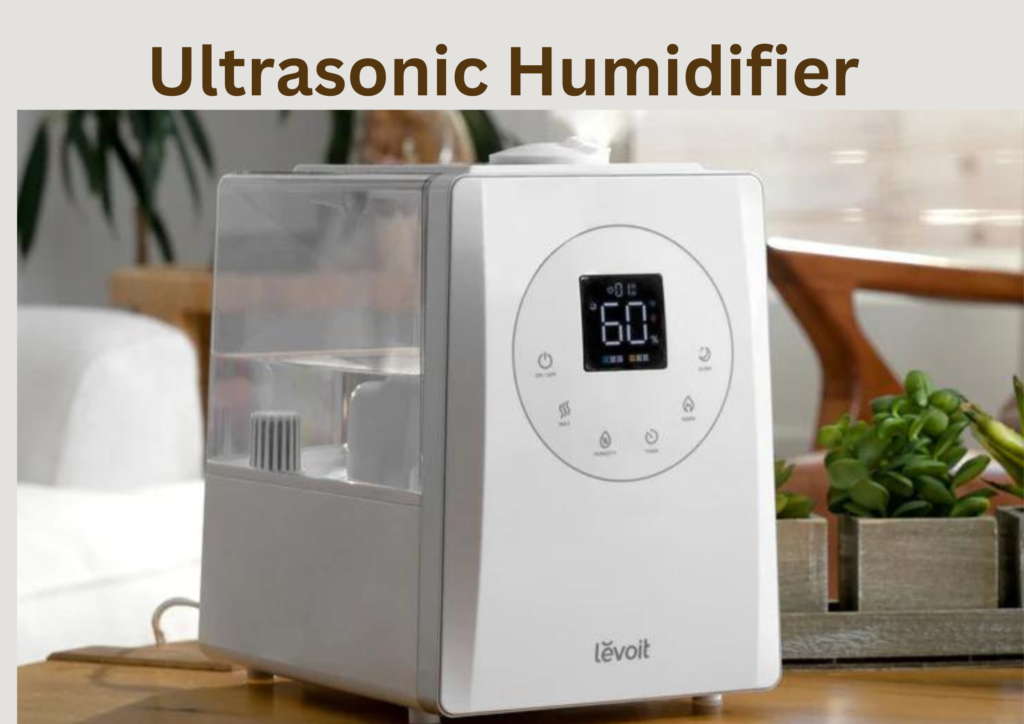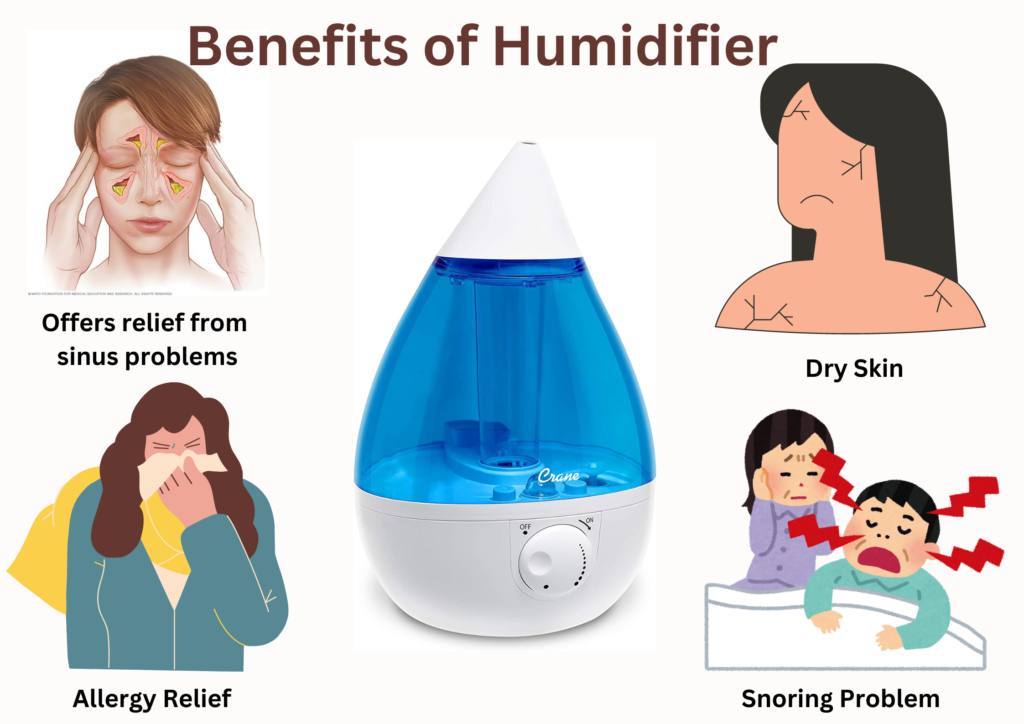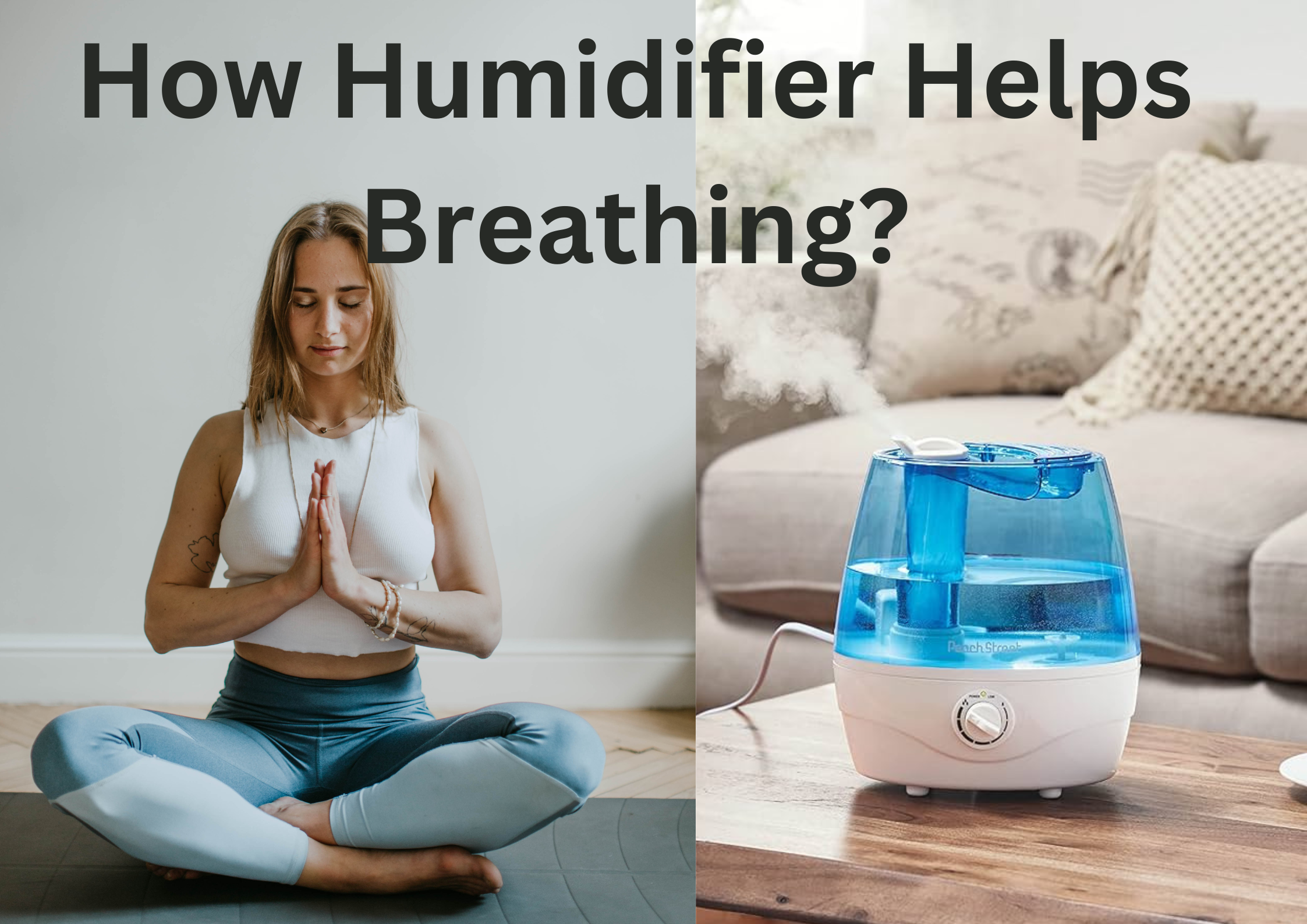If you are suffering from a cold, stuffy nose, or respiratory diseases due to dry air, then a humidifier can help you avoid these problems. A humidifier adds moisture to the air and maintains the humidity level of a room or an entire house. This prevents dryness that causes irritation in many parts of the body. From moisturizing dry skin to easing congestion a humidifier improves a person’s health in various ways.
Read this article to get clear about the importance of humidifiers, “How humidifier helps breathing?”, their types, and their benefits. Also, learn about some key points to consider while purchasing a humidifier.
What Is Humidifier?
You must have experienced humidity in your home or the environment. Humidity in the environment makes you feel hot and sticky. Humidity can be defined as the amount of water vapor in the air. So high humidity refers to a lot of water vapor in the air and low humidity means less water vapor in the air. According to the U.S. Environmental Protection Agency, if a surrounding environment has a humidity level of 30 % – 50%, then it keeps you healthy and makes you feel comfortable.
A humidifier is a device that helps to keep the surrounding environment at a recommended humidity level. It adds moisture to the air in the room or home. Adding a humidifier in the room prevents dryness in the air that can irritate the skin, nose, eyes, throat, and lips.
There are various types and sizes of humidifiers available in the market. A portable humidifier is movable and you can shift this machine from one room to another. To maintain a recommended humidity level of a large area a centralized humidifier is used that is usually attached to the air conditioning systems, ventilators, etc.
Types of Humidifiers
There are several types of humidifiers available in the market. The most common types of humidifiers are listed below.
Central Humidifiers
Central humidifiers are integrated directly into the air conditioning or, heating unit. This is the best option if you want to maintain a recommended humidity level throughout a large area or in the entire house.
The water is automatically pumped into the system through household plumbing in central humidifiers. In this system, the liquid water is first converted into water vapor and the vapor is then vented throughout the space at an adjustable rate.
Cool-Mist Humidifiers
Cool-mist humidifiers add cool or room-temperature mist to indoor air without boiling water or producing steam. Pediatricians recommend these types of humidifiers for small babies or young children for medical purposes.
Cool-mist humidifiers are used for reducing cold or virus-related inflammation. But, these humidifiers need to be cleaned regularly to avoid spreading germs and allergens.

Warm-Mist Humidifiers
Warm-mist humidifiers contain an internal heating element that boils water and converts it into steam. Thus, it releases warm mist into the air.
Warm mist humidifiers are usually used in winter months to provide a warm and cozy environment. These devices are easier to clean and less likely to become contaminated.
Evaporative Humidifiers
An evaporative humidifier contains a water container and a fan to blow moisture through a moistened filter. Thus, they emit cool mist into the air. These are commonly used and affordable humidifiers.
Ultrasonic Humidifiers
Ultrasonic humidifiers are the most straightforward ones. This type of humidifier contains a water reserve and an internal element that vibrates at a sound frequency. It uses ultrasonic vibration to spread water droplets into the air. This device produces a cool mist so, this is a type of cool-mist humidifier.
Ultrasonic humidifiers are effective, consume less energy, and are best for children.

Importance of Humidity Levels for Respiratory Health
According to the World Health Organization our surrounding environment which has a humidity level of between 40% to 60%, shows less ability to transmit virus. This makes a healthy environment and allows our nose and throat to maintain robust immune responses against viruses.
Humidity level is the most important factor that affects respiratory health. When the humidity level falls below 40%, it is known as low humidity. An environment that has a low humidity level causes dry air and thus it affects our health in numerous ways. It irritates the respiratory system and also causes symptoms of asthma. It also causes dry skin, irritated sinuses, sore throat, allergies, itchy eyes, and asthma. Dry air makes you more prone to respiratory diseases.
A balanced humidity level can help increase our oxygen intake and reduce fatigue. It helps you breathe better by losing mucus and adding moisture back into the airways. It also reduces symptoms of asthma and allergies.
A humidifier is the best addition to your home that maintains the humidity level. This improves your respiratory health and helps you breathe better.
How Humidifier Helps Breathing?
The humidifier releases moisture into the air. When you install a humidifier in your room or in the house it keeps the humidity level of your room at the recommended level. The surrounding environment does not get very dry. This keeps the nasal and upper respiratory passage from getting too dry.
If you have a runny nose, cough, or sore throat this device helps you breathe easier. Humidifier does it in two ways. First, it reduces dry indoor air which helps in clearing nasal passages and airways. Second, it adds moisture to the air which can break any trapped mucus, helping you to have more productive coughs and be less congested.

Benefits of Humidifier
- Prevents Cold and Flu
According to researchers, air with a humidity level of above 40% can deactivate influenza viruses. A humidifier maintains the humidity level at the recommended value and reduces the risk of catching a cold or flu.
- Keep Your Hair and Skin Moist
Dry air pulls moisture from the skin which makes the skin dry, dull, and cracking. It also makes your skin itchy and irritated. A humidifier adds moisture to the air and thus moisturizes your skin, increasing its softness and glow. Healthy air also keeps your hair healthy and hydrated and prevents scalp-related diseases.
- Reduce Snoring Problems and Improves Sleep Quality
Dry air also affects your sleep. In dry air, a person’s airways are less likely to be sufficiently lubricated which causes snoring. Lack of moisture in the air also causes sleep deprivation. Humidifiers add moisture to the air reduce snoring problems and improve sleep quality.
- May Ease Sinus and Congestion Problem
Dry air irritates the nasal passageways which produce more mucus. If the mucus is chronic, it can build up in the sinuses, too. It also creates congestion problems. A humidifier adds moisture to the air that reduces irritation, thins out mucus, and avoids sinus problems.
- Prevents Allergies
A humidifier maintains the humidity in the air at a recommended level. This helps in getting relief from symptoms of allergies and asthma runny nose, itchy throat, and cough.
- Improves Air Quality
A humidifier significantly improves air quality by maintaining its humidity level. A healthy air makes a healthy person. To prevent respiratory diseases and allergies doctors often recommend installing a humidifier in the room. A humidifier keeps the humidity at a moderate level and improves air quality of a room or of an entire house.
- Good for Plants
Plants need water from the soil and moist air to survive. Dry air makes indoor plants shrivel up. The humidifier releases moisture into the air which helps indoor plants to grow better.
How to Select The Right Humidifier for Your Home?
While selecting a humidifier for your home you must consider some important points.
1. Humidifier Types
Nowadays various types of advanced humidifiers are available in the market such as ultrasonic humidifiers, evaporative humidifiers, cool-mist humidifiers, warm-mist humidifiers, etc. Each of these humidifiers is designed with different working principles. So, the first thing you consider is the type of humidifier you want for your home.
2. Size and Capacity
The size of a humidifier can be measured in three ways i.e., the amount of space it can effectively humidify, the size of the water holding tank, or the amount of water it will put into a room per day. The whole house humidifiers are available in large sizes. The water tank of these humidifiers is large in size and you don’t have to fill water frequently. But if your house is small and you are purchasing a comparatively large-sized humidifier, then it will adversely affect the room temperature.
So before purchasing a humidifier first measure the size and space of your room or house and buy accordingly. Usually, models for 700 square feet are perfect for a bedroom or living room.
3. Controllability
Previously humidifiers were available with two or three variable fan speeds. But recently advanced technologies such as digital control systems have been incorporated with humidifiers. These types of humidifiers are integrated with a digital hygrometer that indicates the moisture level in the room and a humidistat that can be set for a specific unit to cycle on/off to maintain a recommended humidity level.
Humidifiers with digital control systems are more convenient, efficient, and comparatively more costly.
4. Ease of Handling
The maintenance of a humidifier is very important. To reduce the risk of bacteria and unhealthy air a humidifier must be cleaned in specific intervals. Some water tanks are easily removable where as some are a little harder and complex to remove. So, you must buy a humidifier that is easy to handle for regular cleaning.
5. Noise Level
A low/ silent noise setting in a humidifier is necessary if you purchase a humidifier for your bedroom. Ultrasonic humidifiers are considered the quietest humidifiers as they contain no heating element to boil water.
6. Safety Features
Some humidifiers come with pre-built safety features. They automatically turn off when the humidity level of the room reaches the desired air humidity. This prevents over-saturating the air. Also, some advanced cool-mist humidifiers are there that use UV lights to kill bacteria in the water tank and emit healthy air. You must buy a humidifier with advanced safety features.
Conclusion
Humidifiers convert dry air to healthy moisturized air. These devices help improve respiratory health conditions, prevent cough, and cold, and keep your skin and hair healthy. Nowadays humidifiers integrated with digital control systems are available in the market. These humidifiers check the room’s humidity level and control the process automatically to maintain the optimal humidity level. Humidifiers are great devices for getting healthy air, at the same time they also need proper maintenance.
FAQS
- Is it good to sleep with a humidifier?
Yes, it is good to sleep with a humidifier if you are struggling with respiratory problems, cold, congestion, cough, dry skin, etc. A humidifier maintains the humidity level of a room at the recommended level between 40% to 60% and converts dry air to healthy air.
- What do humidifiers do for skin?
Dry air pulls moisture from the skin which makes the skin dry, dull, and cracking. It also makes your skin itchy and irritated. Humidifier adds moisture to the air and converts dry air to moisturized and healthy air. Humidifier moisturizes your skin, increasing its softness and glow, and keeping skin healthy.
Also Read
Humidifier Vs Dehumidifier Vs Air Purifier: Which One Should You Buy? 2024


29 thoughts on “How Humidifier Helps Breathing? Benefits and Tips for 2025”